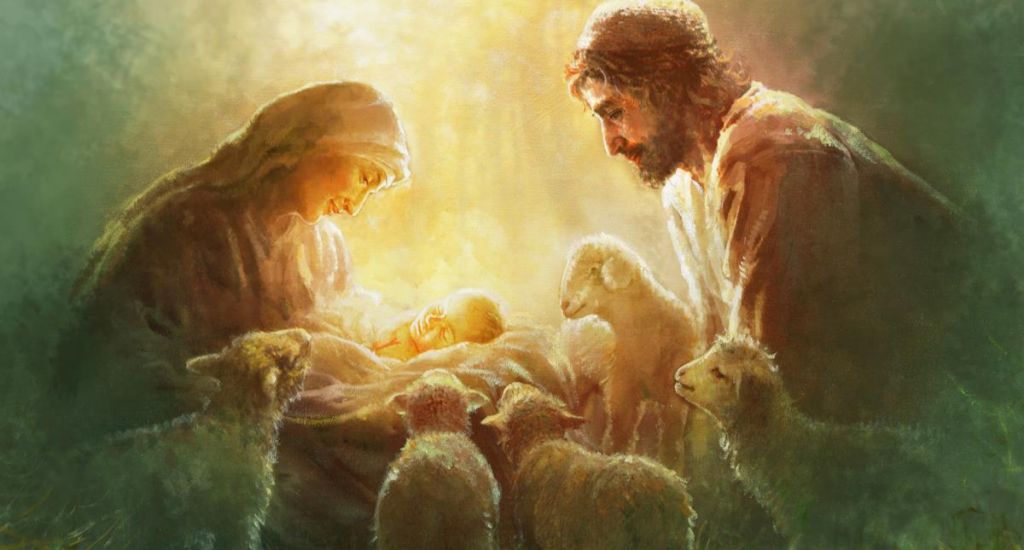
Tomorrow, much of the whole world, whether Christian or non-Christian, will be celebrating Christmas. For many non-Christians, it is a beautiful and cosy time of Christmas lights, carols, good food, and a wonderful time to hang out. For us Christians, we find much beauty in all of this as well, but the real reason for the celebration is found within something of much greater significance.
This piece is not meant as a full-on original article from us, but rather, as a simple meditation, incorporating materials from various sources that have blessed and edified us. We hope it will help arouse a contemplation that will center our hearts on the true substance of Christmas.
The Meaning of Christmas

The origin of Christmas is the “Christ mass” or the yearly gathering in which the birth of Jesus was celebrated. There are many reasons Christians celebrate Christmas. One reason is to remember the faithfulness of God’s promise even from the Old Testament times. Since the Old Testament times, there have already been various prophecies foretelling the arrival of the Messiah. Foremost of these were the prophecies by Isaiah.
Isaiah 7:14
14 Therefore the Lord himself will give you a sign: The virgin will conceive and give birth to a son, and will call him Immanuel.
The name Immanuel (meaning God is with Us) points to the second reason why we celebrate Christmas. The birth of Jesus marked God, the One who made all things, coming to live among His people. This has much import for us as humankind. Because Jesus walked among us, He understand us. He is close to us today, and because He knows us, we can depend on Him, both naturally and spiritually.
John 1:14
14 The Word became flesh and made his dwelling among us. We have seen his glory, the glory of the one and only Son, who came from the Father, full of grace and truth.
Thirdly, the birth of Jesus served as part of God’s redemption. It was the first step in the new covenant that God had promised in Jeremiah 31:31-34. The birth of Jesus was God’s love made manifest among us. Jesus came to live among us, die, and rise again to establish a direct relationship between us and God. With that relationship came many other gifts, the most significant of which is eternal life for all who believe and have faith in the person of Christ and His redeeming work on the cross.
Hope, Joy, Love, and Peace: Well-Known Attributes of Christmas
Even the secular world knows that Christmas is a time of giving. Those who are more cynical about it would view Christmas as a time of opportunity for businesses and merchandisers.
James 1:17 tells us that every good and perfect gift is from above, coming down from the Father of the heavenly lights, who does not change like shifting shadows. What God gives is deeper, abides eternally, and penetrates to the soul. It is spiritual rather than merely temporal, and it does not shift like shadows. Among these gifts are:
- Hope

While it may arise from the past, the gift of hope points forward to the future. The salvation God has Himself secured in Jesus Christ has a future sense: Christ will come again. One day all the sufferings and brokenness in this world will pass away, we will be gathered and transformed with bodies like Jesus’ resurrection body, thereafter to live in everlasting wonder and happiness in the presence of God.
- Joy

The Bible is full of joy. You see it in the Old Testament, particularly in many of the Psalms, but also in much of the New Testament (Luke 2:10, John 15:11, Romans 15:13, Galatians 5:22, and many others). Joy in the Biblical sense is the sense of delight and well-being in God’s presence. Godly joy endures grief, very bad situations, and very tough situations. It replaces hurt, disgust, disappointment, and loss at just the point when those negative feelings ought naturally to dominate. Joy is Heaven’s gift to those who trust and obey (John 3:27). It is the response from hearts “that see” in the light of God’s love.
- Love

Love is the center of the Bible’s message. The Bible speaks a lot of love. It reminds us that God is love and that we love because He first loved us. Biblical love is both declaration and obligation. It transforms the point and purpose of life. While the world looks at the heart of the universe as a cold and distant place, we know that love created the heavens and the earth. Love is God’s supreme attitude, overcomes all difficulties in life (Romans 8:28), and none of life’s obstacles can stand in its power (Romans 8:37). Love is our inseparable bond with God, and through that love, to each other for timeless eternity (Romans 8:38-39).
- Peace

Peace is the proper state or condition that leads to the universal flourishing and well-being of people. The promise of peace finds its fulfillment in Jesus Christ, as He has made peace and reconciled people and the universe back to God (Colossians 2:10). Through His sacrifice, Jesus also brings peace and wholeness to the social order; Jews and Gentiles are no longer divided against each other but united under God. Because we have this kind of closeness between us and God, there is peace in our hearts. A fuller description of peace can be found in a recent message by Pr Benny Liew from Damansara Utama Methodist Church.
The gift of Christmas lasts more than just the season. It abides throughout the entire year and to years beyond. This Christmas, let us celebrate the beauty in the festival, but also with an eye on the deeper beauty of what Christ Jesus has done for us, and in our intimate relationship with Him, with God, and with our loved ones.

This reflection incorporates elements from various materials by The Apostolic Faith Church and The International Fellowship of Apostolic Faith Ministers (IFAFM) (The Meaning of Christmas), and Mack Fackler’s Big Ideas of the Bible (Hope, Joy, Love, and Peace), paraphrasing them within a unified context. Christianity Malaysia is a non-profit evangelical Christian organisation.
|Share The Good News|




Leave a Reply